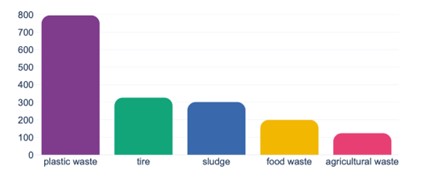Waste-based fuels as part of sustainable mobility
Abstract
One of the main challenges for sustainable and new energy-based mobility is the development of alternative fuels, particularly those produced from waste. This paper aims to review the scientific literature on waste-based fuels and identify key technological, economic, and environmental trends. The paper presents a two-stage methodology: first, a quantitative analysis was conducted using the Scopus database. A qualitative evaluation of relevant studies follows it. The results of the analysis indicate that research primarily focuses on the pyrolysis of plastic waste and high-calorific fractions, as well as the biorefinery concept. In contrast, catalytic and thermochemical processes are the primary focus of the technological approaches. Waste-based fuels offer savings of up to 43% compared to fossil fuels and a favourable emissions profile; however, economic viability and regulatory frameworks remain significant challenges. The study concludes that widespread adoption requires an integrated approach that combines technological innovation, economic incentives, and life cycle assessments.
References
Bourguignon, D. (2016). Closing the loop. New circular economy package. EPRS | European Parliamentary Research Service, Members’ Research Service, PE 573.899. URL: https://www.europarl.europa.eu/RegData/etudes/BRIE/2016/573899/EPRS_BRI%282016%29573899_EN.pdf
Chu, S., Majumdar, A. (2012). Opportunities and challenges for a sustainable energy future. Nature. 488(7411), 294–303. DOI: https://doi.org/10.1038/nature11475
Emőd, I., Füle, M., Tánczos, K., Zöldy, M. (2005). Technical, economic and environmental conditions for the introduction of bioethanol in Hungary. [in Hungarian: A bioetanol magyarországi bevezetésének műszaki, gazdasági és környezetvédelmi feltételei.] Hungarian Science [in Hungarian: Magyar Tudomány]. 50, 278–286. URL: https://epa.oszk.hu/00600/00691/00015/03.html
Huber, G. W., Iborra, S., Corma, A. (2006). Synthesis of transportation fuels from biomass: Chemistry, catalysts, and engineering. Chemical Reviews. 106(9), 4044–4098. DOI: https://doi.org/10.1021/cr068360d
Kondor I. P., Zoldy M. (2020). Combustion simulation investigations using waste-based fuels [in Hungarian: Égésszimulációs vizsgálatok hulladékalapú tüzelőanyagok alkalmazásánál]. International Mechanical Engineering Conference–OGÉT [in Hungarian: Nemzetközi Gépészeti Konferencia–OGÉT], 223–226. URL: https://ojs.emt.ro/oget/article/view/167
Kondor, I. P., Zöldy, M., Mihály, D. (2021). Experimental investigation on the performance and emission characteristics of a compression ignition engine using waste-based tire pyrolysis fuel and diesel fuel blends. Energies. 14(23), 7903. DOI: https://doi.org/10.3390/en14237903
Meadows, D. H., Meadows, D. L., Randers, J., Behrens, W. W. III (1972). The Limits to Growth. A Report for THE CLUB OF ROME’S Project on the Predicament of Mankind. Potomac Associates – Universe Books, New York, NY.
Misra, Y., Kumar, D. J. P., Mishra, R. K., Kumar, V., Dwivedi, N. (2025). Thermocatalytic pyrolysis of plastic waste into renewable fuel and value-added chemicals: A review of plastic types, operating parameters and upgradation of pyrolysis oil. Water–Energy Nexus. 8, 55–72. DOI: https://doi.org/10.1016/j.wen.2025.03.002
Németh, K. (2021). The basics of the circular economy. [in Hungarian: A körforgásos gazdaság alapjai]. Jegyzet. Pannon Egyetemi Kiadó, Veszprém. URL: https://konyvtar.uni-pannon.hu/images/docman-files/efop343/e-jegyzetek/Nemeth_Kornel_A_korforgasos_gazdasag_alapjai.pdf
Sravan, J. S., Sahota, S., Sarkar, O., Reddy, M. V., Mohan, S. V., Chang, Y. C. (in press). Technology advancements in future waste biorefineries: Focus on low carbon fuels and renewable chemicals. Fuel. 404, Part A, 136184. DOI: https://doi.org/10.1016/j.fuel.2025.136184
Sun, Y., Cheng, J. (2002). Hydrolysis of lignocellulosic materials for ethanol production: A review. Bioresource Technology. 83(1), 1–11. DOI: https://doi.org/10.1016/S0960-8524(01)00212-7
Szalmáné Csete M., Zöldy, M., Török, Á. (2024). New mobility solutions: technical possibilities and financial aspects in the light of sustainability [in Hungarian: Új mobilitási megoldások: technikai lehetőségek és pénzügyi aspektusok a fenntarthatóság tükrében]. In Kolozsi P. P. (szerk.): The future of money, the money of the future I–II [in Hungarian: A pénz jövője, a jövő pénze I–II]. METU–MNB, Budapest. 183–199.
Torok, A., Torok, A., Heinitz, F. (2014). Usage of production functions in the comparative analysis of transport related fuel consumption. Transport and Telecommunication. 15(4), 292. DOI: https://doi.org/10.2478/ttj-2014-0025
Tóth, O., Holló, A., Hancsók, J. (2020). Alternative component containing diesel fuel from different waste sources. Journal of Environmental Management. 265, 110562. DOI: https://doi.org/10.1016/j.jenvman.2020.110562
Vershinina, K. Y., Shlegel, N. E., Strizhak, P. A. (2020). Promising components of waste-derived slurry fuels. Journal of the Energy Institute. 93(5), 2044–2054. DOI: https://doi.org/10.1016/j.joei.2020.04.020
Zöldy, M., Szalmáné Csete, M., Kolozsi, P. P., Bordás, P., Török, Á. (2022). Cognitive sustainability. Cognitive Sustainability. 1(1). DOI: https://doi.org/10.55343/CogSust.7
Zöldy, M., Baranyi, P. Z., Török, Á. (2024). Trends in cognitive mobility in 2022. Acta Polytechnica Hungarica. 21(7), 189–202. DOI: https://doi.org/10.12700/APH.21.7.2024.7.11




















